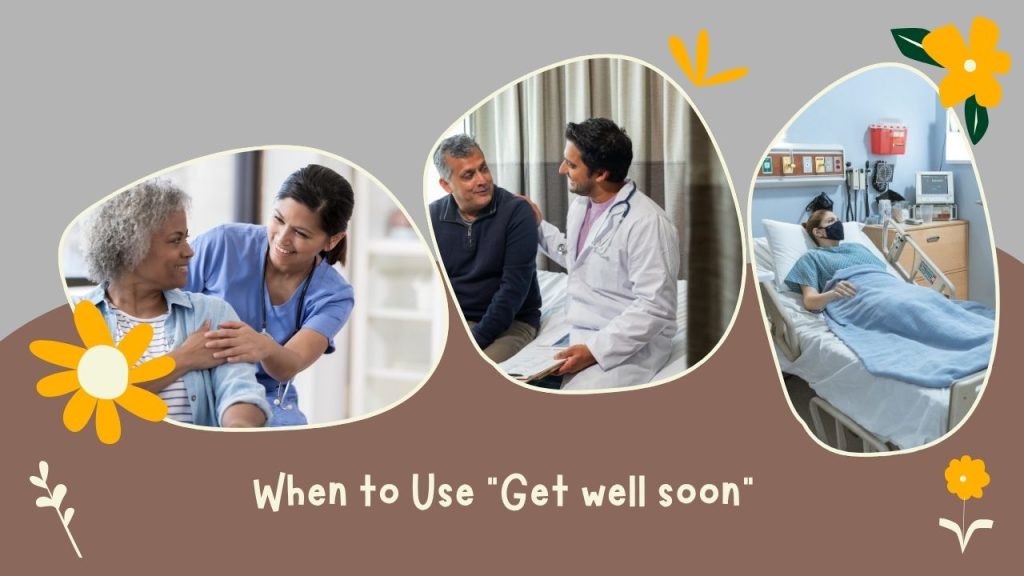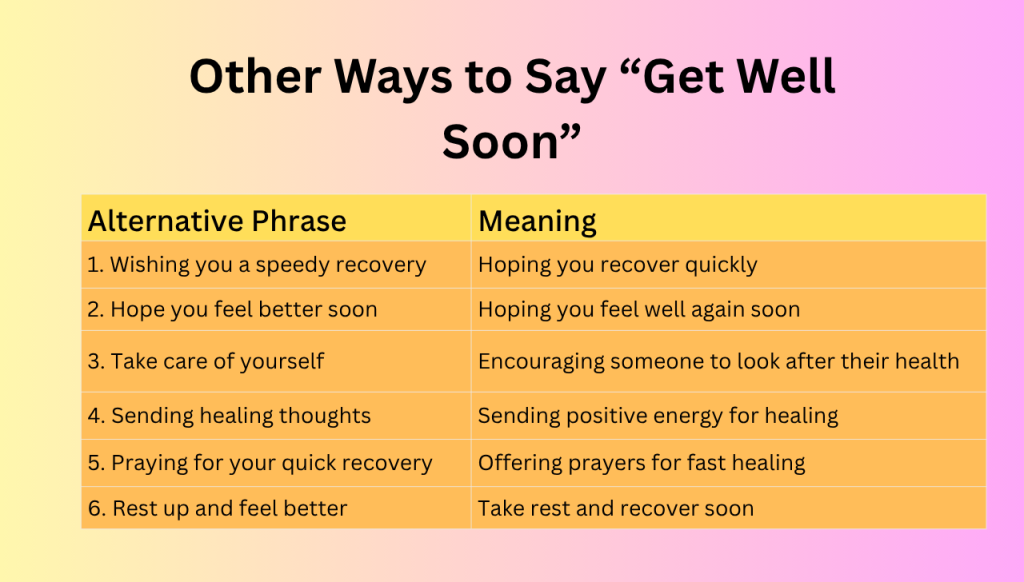When someone you care about isn’t feeling their best—whether it’s the flu, a surgery recovery, or just a nasty cold—there’s this instinctive urge to reach out and say something comforting. Most of us reach for the usual phrase: “Get well soon.” It’s short, sweet, and universally understood. But, let’s be honest—after a while, it can start to sound a bit… robotic, right?
There’s nothing wrong with it, but sometimes you want to say something that feels more personal. More genuine. Maybe even a little humorous or poetic, depending on your relationship. So, if you’ve ever found yourself staring at a greeting card or text message, trying to think of a better way to say “Get well soon”, you’re not alone.
This article is here to help you mix it up. We’ll break down what “get well soon” really means, when it fits best, why we say it in the first place—and of course, offer a bunch of creative, heartfelt, and sometimes quirky alternatives you can use.
“Get well soon” Meaning
Let’s unpack the phrase for a moment. “Get well soon” is a well-wish that expresses hope for someone’s quick recovery. It’s casual but caring and almost become the default response when someone’s unwell.
At its core, it’s a blend of sympathy and encouragement. You’re acknowledging the person’s pain or discomfort and gently nudging them toward better days ahead. It’s a small way to offer emotional support—especially when you cannot do much else.
But here’s the catch: because it’s often used, it can feel a little canned. Like an automated message. And depending on the situation, that might not always cut it. Imagine your best friend had a rough surgery, or a coworker is dealing with burnout. A basic “get well soon” might seem… distant. Finding other ways to say it—more thoughtfully or with a personal twist—can mean a lot.
Don’t Miss This : Other Ways to Say “Thank You for Your Cooperation” in Emails and Workplace Messages

When to Use “Get well soon”
“Get well soon” fits a wide range of situations. But knowing when to use it—and how to tweak it for different scenarios—makes all the difference.
Let’s break it down:
1. Mild Illnesses
Colds, flu, or a short-term bug? Go ahead—“get well soon” works just fine here. It’s polite and appropriate for acquaintances, coworkers, or casual friends.
Alternatives:
- Hope you’re back on your feet in no time!
- Feel better soon!
- Sending you a little sunshine to brighten your day.
2. Chronic Conditions or Long-Term Recovery
If someone is facing a long recovery, chronic illness, or ongoing treatment (think chemo, surgery rehab, or mental health challenges), a simple “get well soon” might feel too vague—or even dismissive.
Better alternatives:
- Thinking of you every day and cheering you on.
- Here whenever you need a laugh, a meal, or a distraction.
- Wishing you strength and patience as you heal.
3. Professional Settings
Workplace etiquette matters. If a colleague or client is out sick, it’s best to keep your tone respectful and neutral.
Professional-friendly options:
- Wishing you a smooth and speedy recovery.
- Looking forward to having you back with us soon.
- Take all the time you need to rest and recover.
4. Kids or Teens
Sick children need a gentler touch—and sometimes a bit of fun.
Ideas:
- Feel better, superhero!
- Rest up, champ—adventures await!
- Hope you’re back to your awesome self soon.
So really, it’s not about avoiding “get well soon”—it’s about adjusting your message to fit the person and the moment.
Why Say “Get well soon”
Here’s the deeper question: Why do we say anything? What’s the point of “get well soon,” or any version? Turns out, it’s about more than just manners.
1. Emotional Support
When someone’s not well—physically or emotionally—they often feel vulnerable. A kind message, no matter how simple, offers a connection thread. It tells them, “Hey, I see you. I care.”
Even a short note can provide comfort during long hospital days or draining routines.
2. Social Ritual
Saying “get well soon” is part of how we bond. Like “happy birthday” or “congrats,” it’s a shared language. Skipping it can feel cold; saying it reinforces empathy.
3. Energy Boost
Believe it or not, encouraging words can help with recovery. Studies show that positivity—whether from loved ones or coworkers—can lift someone’s spirits and, in turn, their health outlook.
4. It Opens the Door
A well-placed message can be an invitation. It says: “I’m here if you need anything.” That door matters whether it leads to a deeper conversation, a visit, or just a smile.
So the next time you wonder whether to send that card or text—yes, it does make a difference.

30 Other Ways to Say “Get Well Soon”
| Alternative Phrase | Meaning |
|---|---|
| 1. Wishing you a speedy recovery | Hoping you recover quickly |
| 2. Hope you feel better soon | Hoping you feel well again soon |
| 3. Take care of yourself | Encouraging someone to look after their health |
| 4. Sending healing thoughts | Sending positive energy for healing |
| 5. Praying for your quick recovery | Offering prayers for fast healing |
| 6. Rest up and feel better | Take rest and recover soon |
| 7. Hope you’re back on your feet soon | Wishing you to be active again quickly |
| 8. Take it easy and get well | Relax and recover |
| 9. Get better soon | A direct wish for health improvement |
| 10. Feel better! | Casual way to wish wellness |
| 11. Sending positive vibes | Offering emotional support |
| 12. Hope you bounce back soon | Wishing for a fast recovery |
| 13. Wishing you strength and health | Hoping for physical and emotional strength |
| 14. Hope you’re on the mend | Hoping your condition is improving |
| 15. Thinking of you | Letting them know you care |
| 16. Get some rest | Encouraging rest to heal |
| 17. Hope you heal quickly | Hoping for fast healing |
| 18. May you feel better every day | Wishing gradual improvement |
| 19. Hope you’re feeling stronger | Wishing physical strength and recovery |
| 20. May your health improve soon | Formal way to wish for recovery |
| 21. Speedy healing to you | Quick way of saying “heal fast” |
| 22. Take good care | Wishing well-being through self-care |
| 23. You’re in my thoughts | Expressing emotional support |
| 24. Hang in there | Encouraging words during recovery |
| 25. Hope today is better than yesterday | Wishing daily improvement |
| 26. Sending warm wishes | Offering kind thoughts |
| 27. Wishing you comfort and peace | Hoping for relief from pain or stress |
| 28. Hope you’re feeling yourself again | Hoping for return to normal health |
| 29. Hope you get lots of rest | Encouraging sleep and relaxation |
| 30. Feel better day by day | Wishing steady improvement |
Don’t Miss This : 30 Other Ways to Say “Thank You for Your Understanding”
Conclusion
Here’s the thing—whether you go with “get well soon” or come up with something a little more original, the most important part is simply reaching out. It’s not about having the perfect words. It’s about showing someone that you care enough to say something.
So next time someone you know is under the weather, don’t just default to the standard line unless it fits. You’ve got options—warm, witty, wise ones. And if you ever feel unsure, remember: sincerity beats eloquence every time. In the end, people don’t remember the exact phrase you used. They remember the feeling you gave them. And honestly? That’s more than enough.

Grammar Nerd, ESL Trainer, Low-Key Comma Crusader
Daniel has taught English for over a decade, from small community classes in Oaxaca to bustling university halls in London. He has a knack for turning even the driest grammar points into relatable, real-life language tools—think fewer red pens, more real talk. He co-founded Grammation to make grammar less gatekeeper-y and more global. When he’s not decoding sentence structures, he’s probably hiking with a paperback novel or adding unnecessary hyphens for fun.
“The rules of grammar should empower people—not trip them up.”


